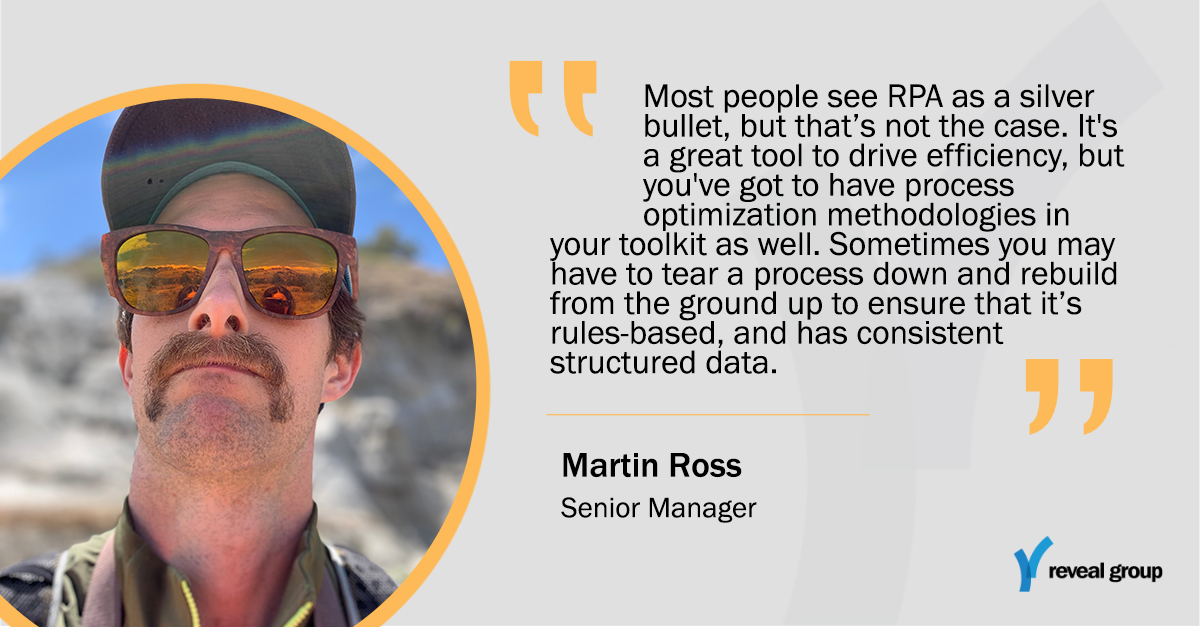
Life at Reveal Group
Tell us about your journey discovering RPA.
I received a Bachelor’s degree in Mathematics with an MBA in finance, which somehow led me into the continuous improvement and project management space for a Finance and HR shared service center in Nashville, TN. One of our continuous improvement projects was to stand up an RPA Center of Excellence within the shared service center. It was within the context of this project that I got my first exposure to RPA as we evaluated the big 3 platforms, and eventually selected UiPath. I was able to get my hands on the free Community Edition and build out several “proof of concept” automations to support my day-to-day responsibilities. I knew I wanted to dive deeper into the space and was able to leverage that experience to get a full-time RPA developer role with a midsize accounting and advisory firm. I gained a ton of experience in that year before being recruited to join Reveal Group in June of 2019.
What does a typical day in the world of automation look like for you?
My job varies daily, but there is some consistency in my everyday work activities. Almost every day begins with several client meetings for the multiple projects that I’m involved in. The middle part of my day generally varies, but the underlying theme is that I’m making sure the people on my projects have what they need to do the work that they’re responsible for. Helping each other is a major theme throughout all of our work and projects we take on within Reveal Group. I love getting involved and being able to advise on our team member’s needs while getting to know everyone on a personal level. Toward the end of the day, I’m frequently connecting with our Australian team to coordinate global efforts where needed. This field of work allows me to fill up my day and explore all kinds of activities.
What excites you the most when it comes to the evolution of RPA technology?
What makes me most excited is taking RPA and using it as a bridge for integrating these ancillary technology products that are on the fringe of the intelligent automation space. For example, things like natural language processing (NLP) or intelligent document processing (IDP) – these solutions allow you to tackle some of the more challenging processes out there. RPA generally serves as the over-arching bridge that can help integrate those technologies into existing applications and existing processes. It’s an exciting time to be a part of this growing industry. New advancements in software and various technologies pop up all the time and I’m always thrilled to learn more about how these updates can help benefit our clients and our internal team as a whole!
In your experience, what is the most common misconception about RPA?
The biggest misconception that I come across through engagements, without fail, is that RPA is a Band-Aid to fix broken processes. When you peel back the covers at larger organizations, you often find a ton of inefficient and broken processes that support the entire operation. The business might have an operational excellence team overseeing and trying to clean up some of those processes, but it can be hard to fix automations that weren’t built on viable processes to begin with. As soon as RPA is introduced as a new tool to an organization, a lot of the teams that have broken processes get excited because they see RPA as a silver bullet. Unfortunately, it is not a silver bullet at all. It’s a great tool to drive efficiency, but you’ve got to have process optimization methodologies in your toolkit as well. To truly be able to apply RPA effectively you have to first consider the overall health of the process and recognize that RPA might not be the right first move. It may be better to tear down the entire process and rebuild it from the ground up so that it is rules-based and has consistent structured data. More importantly, removing the human judgment components and putting them somewhere else often allows automation to be applied more effectively. All too often this isn’t done, and processes get queued up as automation projects that aren’t ready to be automated. There is other work to be done before or in tandem with automation.
Can you share advice for all our future RPA developers out there?
At any stage in your career, if you’re interested in intelligent automation – you need to get your hands on the tools. Most of the tools have free versions that you can play around with and some type of training. Specifically, with UiPath, they have a very comprehensive Training Academy. Just get your hands on the tool and start playing around with it. Try automating your day job! (Well, parts of it). Get the hands-on experience and then educate yourself on best practices. These actions will help jumpstart your career and you’ll quickly find out whether it’s something you’d like to pursue.
Interested in working for Reveal Group? Click here to view our current openings: Company – Reveal Group
